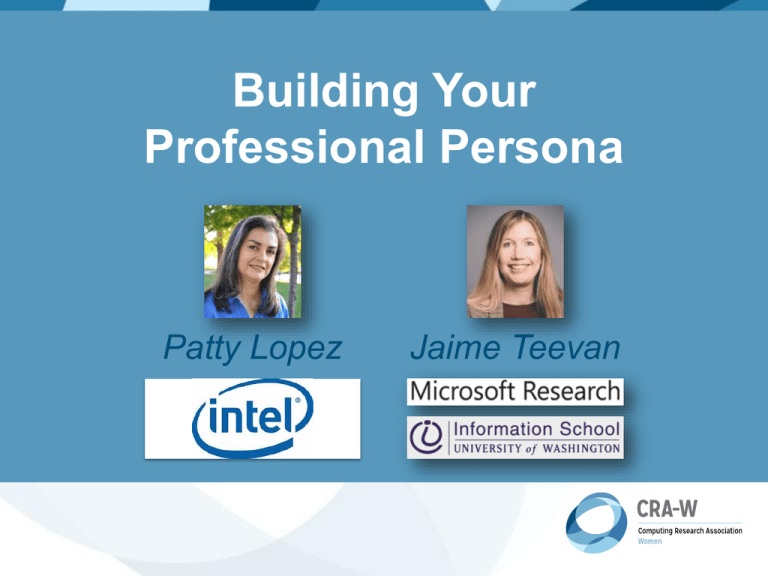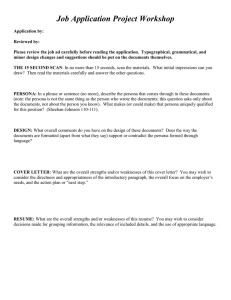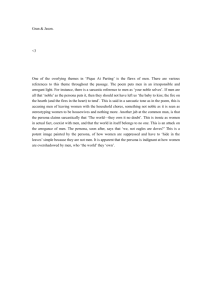Building Your Professional Persona Jaime Teevan Patty Lopez
advertisement

Building Your Professional Persona Patty Lopez Jaime Teevan CRA-W Programs inspire and increase the success of women & minorities in computing 600+ students & PhD researchers every year from 250 U.S. institutions What does CRA-W do? Individual & Group Research Mentoring Undergrads: Undergraduate Research Experiences Undergrads: Distinguished lecture role models Grad Cohort: group mentoring of graduate students Grad Students: Discipline Specific Research workshops PhD Researchers: group mentoring early & mid career @ CMW, CAPP, Grace Hopper & Tapia Academic careers Undergraduates Graduate Students Industry/government labs 600+ students & PhDs a year More info on programs at: table right outside and CRA-W Booth #540 in the exhibit hall Building Your Professional Persona Agenda • What is your Professional Persona? • Representing yourself through • Your published research • Your online presence • Your professional conduct What is your Professional Persona? What Is a Professional Persona? • Your professional character and reputation • How you distinguish yourself from your peers • A narrative that describes your expertise and personal brand • Creates interest in your ideas and contributions • Enables you to seek greater opportunities Why Do You Need One? • • • • • • • • Job opportunities Invitations to present, publish, & participate Award nominations External evaluation Media opportunities Research visibility Recruiting Visibility within your institution How To Develop One? Develop your personal brand with five components: 1. Competencies: Your special skills fulfilling task requirements 2. Personality: Your behavior, communication skills, and attitudes 3. Differentiation: What separates you from others, leaves a lasting memory 4. Social Media Presence: How you present yourself online in various forums 5. Appearance: Your body language, clothing attire, and overall posture Use your personal brand to differentiate yourself and make a positive impression Activity: Develop Your Persona Practice your elevator pitch Share research you’re working on/most interested in Online presence • What three adjectives would you like others to use to describe you? • What would you hate to hear said about yourself? Poll: Who in the audience would like to share their exchanges? What was hard, and what was easy? How To Develop It? • Offline: • Do good research! This is what counts the most. • Your workday life: colleagues, students, professors • Volunteer at your department, school, conferences, though research comes first • Online: • • • • • • Your published body of research Professional web site Organization web site(s) General ‘academic’ web sites LinkedIn Facebook, Twitter, Tumblr etc. First Impressions Matter • Make full use of it! • With a brief glance, people evaluate you • In person • Dress to your professional persona • Develop an elevator pitch for yourself • Film yourself: What does your body language say? o o o o How do you stand, move, and gesture? Where do you look? Do you make eye contact? How do you speak? How do you take and respond to questions? • Online • Create a professional webpage • Search for yourself: What do the search results say about you? Representing Yourself Through Your Published Research Publishing Your Research Benefits - Advance the state of the art Public evidence of your abilities Quality v. quantity - Quality! Quantity varies by area Citations matter as career progresses How to generate citations - High quality work High visibility outlets Strong online visibility Avenues for Publication Primary outlets - Conference papers Journal papers Additional - Workshop Abstracts Doctoral consortium Abstracts/Posters Conference/Workshop Posters Other outlets - Software, patents, books, data repositories Social media: Blogs, Twitter, YouTube Submission Process Uniform submission date - May have separate abstract deadline Program committee - May be hierarchical - May have non-committee reviewers Decisions - May be two-pass Details vary: Read the CFP carefully!!! Preparing Your Submission • • • • • • • Make the problem and its importance clear Make your contributions clear Provide visual illustrations when possible Describe existing research and how it relates Informed experts should be able to reproduce Acknowledge limitations Clearly explain your results, contributions http://slowsearching.blogspot.com/search/label/Writing Review Process • Understand reviewer roles • • • • Reviewers are experts in the field Must not have a conflict of interest Single-blind, double-blind, etc. Meta-review • Support reviewer selection • • Reviewers drawn from: • Citations, lit search, contacts • Keywords or categories (beware of breadth) Often accept based on title, abstract Dealing with Reviews • Separate out the emotional response • Write a rebuttal or make edits later • Understand the reviews • Identify important issues • Get to the root cause of complaints • Issues you already address were unclear • Respond to the reviews • Reviewers will see the paper again Dealing with Rejection • Great papers sometimes get rejected • There is variation and error in process • New or bridge topics particularly at risk • Keep trying • Good target: Three submissions • Consider a venue change • Match content to the best audience • ALWAYS address reviewer comments Publication Process • Prepare the camera-ready version • Goal is strong paper, not just accepted paper • Address reviewer comments • Promote the research • Link to it from your webpage • Blog about it • Tweet about • Present the paper Presenting Your Research • • • • • • • • Tailor your content to your audience Fit your material into the available time Outline what you plan to present Ensure your material is engaging and segues smoothly Check your verbal and body language Avoid reading your slides, make eye contact Summarize your key points at the end Acknowledge your contributors Representing Yourself Through Your Online Presence Creating an Online Presence • • • • • • Create web content you can control Support access to your publications Manage what people find Invite trusted friends to follow and share Encourage comments, but moderate content Post regularly to bring in fresh insights and perspectives Poll: Content You Control Raise your hand if you have: 1. Professional webpage 2. A university or work page 3. A Facebook account 4. A Linked-In account 5. Twitter, Tumblr, or social media account 6. A professional blog Your Professional Website What to list is your greatest locus of control: • Publications • Research interests • Media coverage • Photos • Teaching materials • Link to resume, CV, biography • Personal information – choose what you share CV/Resume • You must have one! • It should be up-to-date - you can quickly update with new info within 2 hours • You may choose to link to it from the web • Ask a friend to review it Internal Company Visibility Companies may have “internal only” places to represent yourself: • Confidential project pages • Internal social networking and blogs Patty: • Mailing lists (scrutinize external addresses, distribution group lists & email distribution lists with many names) • Internal talks • …. External Professional Visibility Disseminating Technical Publications • Present in technical venues with proceedings • Connect with people in your research area at conferences, relate their work to yours • Ensure current info about you appears in scholarly digital libraries • You are the best ambassador for your own work o Find a way to highlight your expertise in a way that is authentic for you o University or department communications look for researchers to highlight and work to showcase o Use social media to link your articles Managing What People Find How do you show up in search engine results? Managing Your Web Presence Top 5-10 hits: • Does your professional website appear? • Does your LinkedIn profile appear? • Manage what you can control and try to remove or live with what you can’t (bad crops, people w/same name) • Check multiple search engines, and set up an alert Optimizing Your Web Presence • Know what generates “hits” • How do you show up currently? • Blog/post articles relevant to your persona in the appropriate forums • Encourage others to link to your content • Include keywords that promote your persona • Keep your web content fresh • Reciprocate with like-minded others who promote you Representing Yourself Through Your Professional Conduct Reflect Your Persona in Your Work Habits • • • • • • • • • Advocate for yourself and your ideas Balance long- and short-term goals Be open to opportunity Strive to be authentic Show up and persevere Grow your skills, technical and soft Respect others, be inclusive and available Display and maintain a positive attitude Show willingness and gratitude Author Responsibilities • Do NOT plagiarize • • • Obtain permission for use of material Cite and acknowledge work Be explicit about reuse of previous work • No dual submissions – if unsure, ASK! • Attend conference and present your work • Support the reviewing process • • • Submit work you are proud of Respond to the reviews you receive Provide thoughtful reviews Successful Co-Authorship Collaborations fundamentally important! • Be explicit and generous with authorship • Authors: Contributed, verified, can present • Author ordering by contribution or convention • Acknowledge generously • Be a good collaborator • Externalize thinking, get ideas onto paper • Be respectful of time • Speak up Reviewer Responsibilities • Reasons, not binary a decision, matter The clarity and validity of the reasons you give for accept or reject matter • You are making an impression The person who assigned you the review will form an opinion of your ability and maturity from your review • Get credit for your work if assigned as a sub-reviewer, ask that you be acknowledged by the event or journal Reviewer Responsibilities • Integrity, objectivity, accountability Do NOT reject a paper because • You are writing a paper on the same subject • You do not like the author • Confidentiality Single blind, double blind reviews Paper is not publically available – do not use ideas from it • Conflicts of interest with people who Work in the same place (never) Was your advisor (never) Have written papers together (recently) Have a financial interest Double blind a challenge – if unsure, ASK! Addressing Underrepresentation and/or Misconduct • Look for/ask about technical conferences with diverse keynotes and panels • Look beyond immediate circle of reviewers and encourage others to do the same • Report misconduct whenever possible • Ask conference organizers for a code of conduct policy if one does not exist: o http://adainitiative.org has resources & training available Summary • Discovered your Professional Persona • Discussed how to represent yourself through • Your published research • Your online presence • Your professional conduct Questions? Acknowledgements Thanks to material provided by: • Ayanna Howard, Georgia Tech • Amanda Stent, Yahoo Labs • Holly Rushmeier, Yale University • Mondira Pant, Intel Corporation • Ellen Spertus, Mills College • Dilma da Silva, Texas A & M University • Cecilia Aragon, University of Washington Thank you to our sponsors Private Foundation Unversity Departments www.cra-w.org

